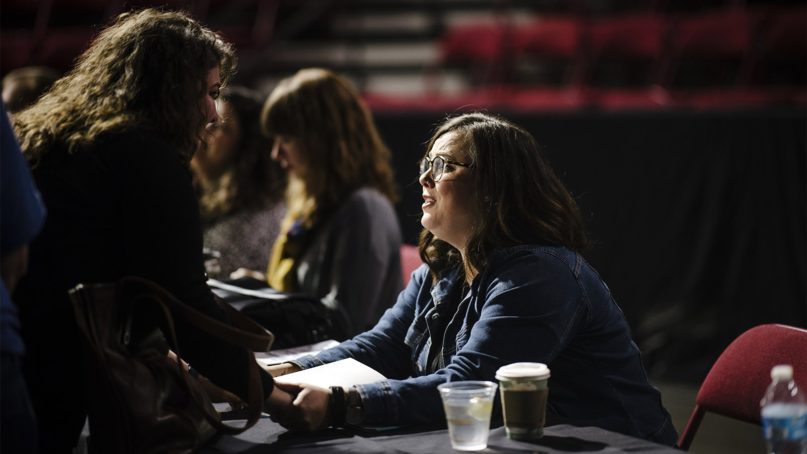DENVER (RNS) — The Evolving Faith 2019 conference, the second annual gathering of progressive Christians (most of them with evangelical backgrounds), opened this weekend with a song-prayer, offered by Melaney Gleeson-Lyall, a member of the Musqueam and Snawnawas indigenous people groups located near Vancouver.
“We are all one, one heart, one mind, one spirit,” Gleeson-Lyall said to the nearly 2,500 people gathered for Evolving Faith 2019 at the University of Denver’s Ritchie Center hockey arena, before breaking into the Musqueam tribe’s language, accompanied by her drum.
The brainchild of two Christian authors and bloggers, Sarah Bessey and the late Rachel Held Evans, Evolving Faith is aimed at “wanderers, wonderers, and spiritual refugees,” according to its website, though most of the weekend’s attendees had come to hear refugees specifically from traditional (mostly white) evangelicalism discuss how to remake its image.
RELATED: Are Christian conferences racially exclusive?
In practice that meant making “inclusion” an oft-referenced goal for the conference. The speaker list alone made that clear — a Christian who’s-who of black, brown, LGBTQ and female voices. At a time when many Christian conferences have come under fire for having primarily cisgender, straight white men on stage, Evolving Faith featured only one: Pete Enns, who, during the “Evolving Faith & Bible/Theology” session, described his own journey toward becoming an “agnostic Christian.”
During the opening session, Christian author and journalist Jeff Chu, who joined Bessey and Held Evans on the Evolving Faith team after the 2018 conference, welcomed a long list of groups ranging from introverts to the disabled, from the “frozen chosen” to the pansexual, from “you who do sex work to pay the bills,” Chu said, “and (to you) who are clutching your pearls because I just said ‘sex work.’”
“You who doubt, you who struggle, you who feel lost, you are loved.” Chu continued. “Atheists, agnostics, seekers, you are loved.”
The conference also offered a POC lounge for people of color as a place to “sit and rest, have a drink and something to eat, or find some company,” according to the event’s program booklet. “While gatherings like this one can challenge all of us, they are often especially exhausting for people of color.” A care team and several Evolving Faith speakers had “office hours” in the lounge.
“The POC lounge really stood out to me on the itinerary,” said one conference attender who identified as half-Japanese and half-Jewish and requested to stay anonymous. “It’s one of the reasons I decided to come.”
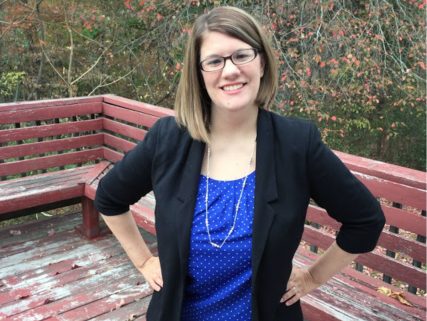
Rachel Held Evans. Courtesy photo
In 2015, Held Evans and the iconoclastic Lutheran minister Nadia Bolz-Weber teamed up with Jim Chaffee, a Christian-industry management agent, to produce the Why Christian Conference, to bring together thinkers and writers to talk about how faith was, or could be, relevant to a secularizing culture.
When, last year, Held Evans and Bessey, again in partnership with Chaffee, hosted the inaugural Evolving Faith conference in Montreat, N.C., Bessey said she expected 200 people. She was “overwhelmed” when the event sold out and 1,400 people attended. For the 2019 installment, the two brought on Chu as an additional partner.
They were in the midst of planning and had selected most of the speakers when Held Evans fell ill. Best known for her popular blog and best-selling books, including New York Times best-seller “A Year of Biblical Womanhood,” “Searching for Sunday” and “Inspired,” she had reacted badly to medication intended to help her recover from an infection. After being put in a medically induced coma in an effort to save her, she died May 4 at age 37.
“Her fingerprints are all over this entire gathering. We planned so much of it with her. So, I will not pretend over the next two days that we are not utterly heartbroken,” said Bessey. But, she later told the crowd, “I know she would not be happy if we turned Evolving Faith into a two-day shrine for Rachel. Frankly, she would be pissed.”
Nonetheless, Evolving Faith 2019 became in part a consolation for readers, friends and devotees of Rachel Held Evans.
RELATED: ‘Who will be our Rachel now?’ Progressives reflect on movement without Rachel Held Evans
“Last year at Evolving Faith, I came out on stage beside Rachel,” Bessey told the audience at the opening session. And like a lot of you in this room, I really miss her. And it feels very lonely to be here today in a lot of ways. I feel sad and angry still.
“We have all showed up hungry,” she said. “We have showed up thirsty. And now we are going to preach the gospel to one another and to ourselves.”
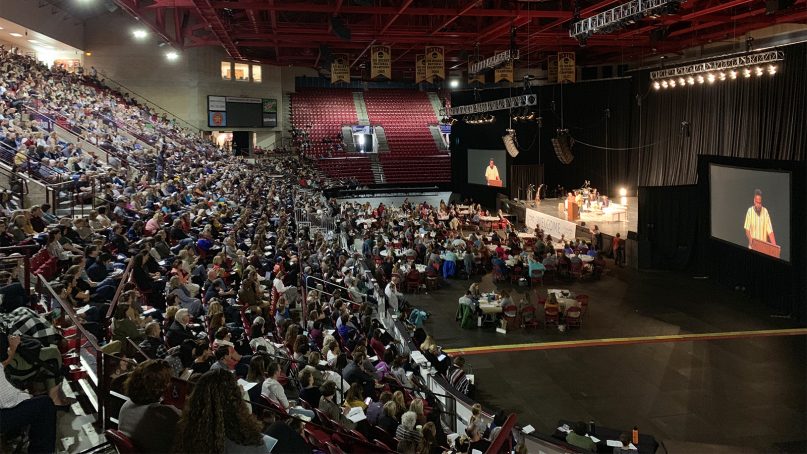
William Matthews speaks onstage during the Evolving Faith conference on Oct. 4, 2019, in Denver. RNS photo by Roxanne Stone
Dan Evans, Held Evans’ husband, also spoke during the opening session, reading an excerpt from a book she had been working on before her death and which will be published posthumously in 2020.
In his remarks, Evans opened up about some of his own personal struggles with faith and Christianity — embodying a theme for the conference and a common thread within the audience: a journey of deconstruction and an uncertainty of where to go from here.
“I’m agnostic,” Evans said. “I haven’t been public with this.
“I wish I was certain we were all going to live forever,” he continued. “I wish I was certain we are all going to heaven. I wish I was certain I would see Rachel again. But it doesn’t seem very likely to me. I don’t know.”
These days, Evans said, when people ask him what he believes, he replies, “I think I’m agnostic, but I don’t know.”
“If you are agnostic, you are welcome here,” Evans said. “I feel welcome here. My doubts don’t seem too big for this group to handle.”
The doubters were well supported with pastoral elements. In addition to the POC lounge, Evolving Faith also offered an Art Area with craft supplies — “for those who would like something to do with their hands as they listen to the speakers” — prayer request boxes where attendees could submit written prayer requests, and a “Spiritual Friend,” Dr. Grace Y. Kao, who was available for conversations to help “process all that you’re feeling.”
The conference’s format included five hour-long mainstage sessions, each consisting of three speakers who gave 18 to 20 minute talks, while the other two speakers sat on couches situated behind the podium. Concluding each session was a “living-room” conversation between the speakers and either Chu or Bessey. Sitting on the couches, they discussed the ideas they had just heard from one another.
Day one sessions included “Evolving Faith & The Wilderness,” “Evolving Faith & Theology/Bible,” “Evolving Faith & Human Dignity,” and “Evolving Faith and Justice & Decolonization.”
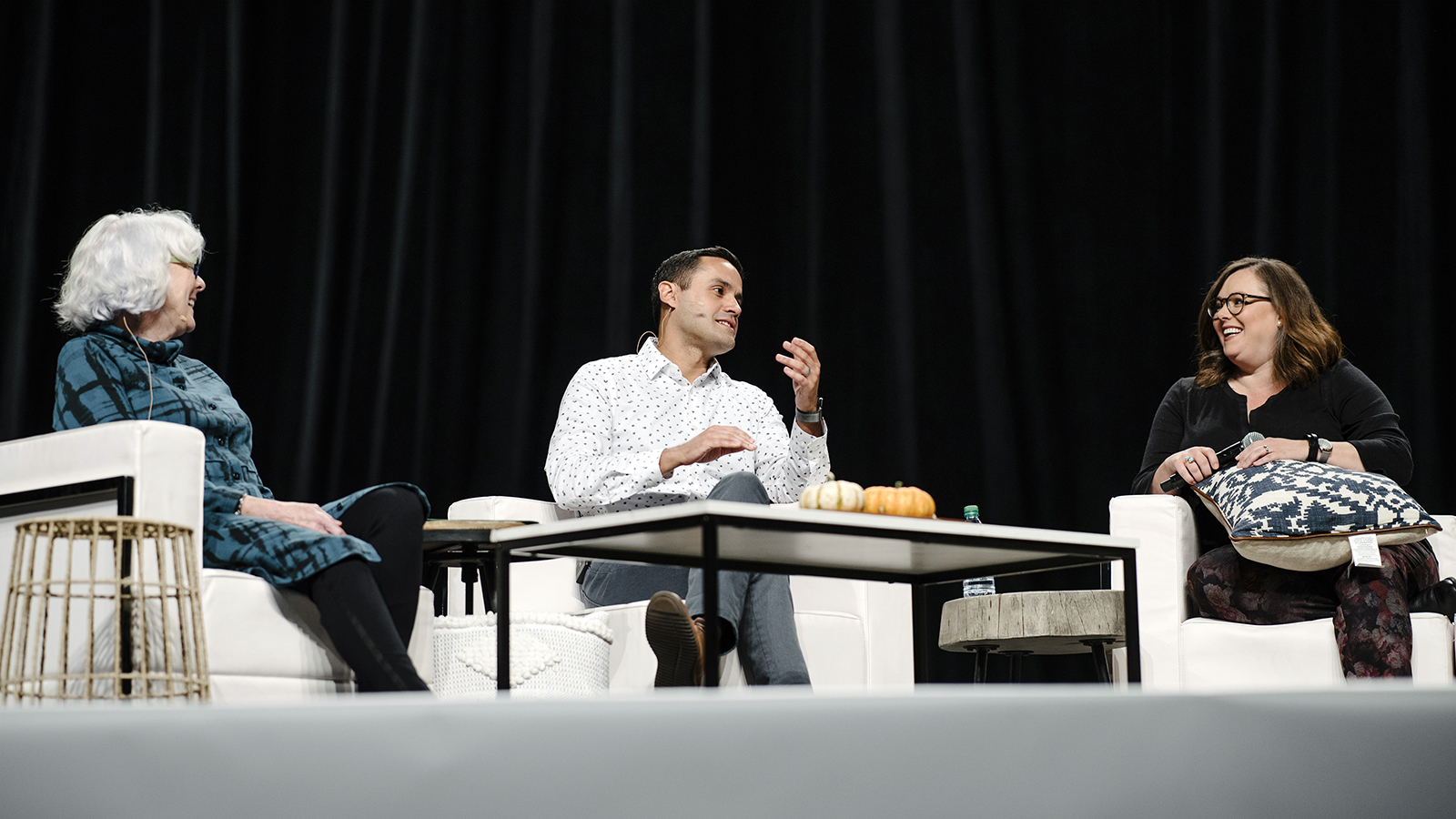
Barbara Brown Taylor, from left, Dr. Eric Baretto and Sarah Bessey have a “living room conversation” after their session on “Evolving Faith & The Wilderness” on Oct. 4, 2019, in Denver. Photo courtesy of Carnefix Photography
On the morning of day two, attendees could choose between six workshops, ranging from Gender Diversity, to the Enneagram, to “Justice, Deconstruction & Soul Care.”
After a final mainstage session titled “Evolving Faith & Your Story,” the conference concluded with a communion service led by Bolz-Weber with music by William Matthews and Jennifer Knapp.
In most of these sessions, the work of deconstructing one’s faith was balanced by figuring out what — if anything — to replace it with. “I think our faith is evolving now, because we are waking up to the reality that that faith — that twisted, malformed faith that spoke human hierarchy into the world and reinforced it — we’re finally waking up to it and saying ‘no,’” said activist Lisa Sharon Harper during the final session. “But now we have to figure out what it’s supposed to be. What is the vision for what it’s supposed to be?”
The catalysts of deconstruction may have been different for each speaker — racism, sexism, colonialism, LGBTQ exclusion, illness or the “problem of evil” — but their experiences mirrored one another: personal doubts and questions, hostility and even rejection from their churches once they questioned authority or otherwise came out of the closet.
This wasn’t true of only the speakers. Two attendees who spoke with Religion News Service on condition of anonymity said they did so because they “didn’t want people at church finding out I’m at this conference.”
For some, the pain of deconstruction came not because they were excluded directly but because they felt or espoused solidarity with those who are. Author Jen Hatmaker talked about the rejection that followed when she publicly announced she was LGBTQ affirming.
“I’m guessing you are going through some kind of deconstruction with your faith, your church, and you are having some kind of feelings about it,” she said from the stage. “I’m also guessing many or most of you are not attending the church or denomination of your childhood — or you wish you weren’t. You are in that weird, messy in-between space where you aren’t sure what to hold onto and what to let go of.”
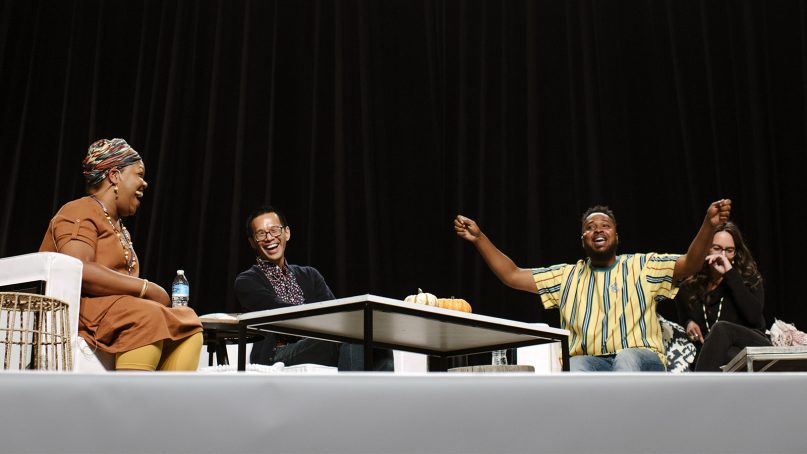
Dr. Chanequa Walker-Barnes, from left, Jeff Chu, William Matthews and Kaitlin Curtice talk together on stage after their session “Evolving Faith and Justice & Decolonization” — which Chu said “hit some nerves.” Photo courtesy of Carnefix Photography
The Rev. Barbara Brown Taylor, an Episcopal priest and theologian, described this liminal space in her talk on day one as “the wilderness” and wasn’t shy about naming its difficulties. “If there wasn’t any danger, then it wasn’t a real wilderness,” she said. “If something can’t kill you, then it’s not really the wilderness. Otherwise, you’re not in a wilderness, you’re in a park.”
Brown Taylor noted in an interview with Religion News Service that she’d expected to be quite a bit older than others at the conference. “Isn’t it surprising how much gray hair there is here?” she said. “It turns out people here are dealing with what a lot of people my age are dealing with.”
Asked why she believed people of all ages are asking questions about faith now, she said: “I think the questions got sanctified. Maybe sanctified is the wrong word, but they’ve been authorized.”
A conference so dedicated to naming the pain of deconstructing one’s faith might be cathartic, but during a “family meeting” discussing the future of Evolving Faith near the close of day two, Bessey and Chu insisted that is not enough. “We want to be a community that names what we are for, not simply what we are against,” said Bessey.
“We see this as equipping and empowering folks to go home to their congregations and bring this,” Chu told Religion News Service. “To go home with hope — not just hope for you, but to share. We have to shift mindsets from being spiritual consumers to spiritual co-creators.”
RELATED: Missions: Is it love or colonization?
Chu acknowledged that some of the sessions might have made people in the audience uncomfortable — in particular, he pointed out the “Evolving Faith and Justice & Decolonization” session featuring William Matthews, Kaitlin Curtice and Dr. Chanequa Walker-Barnes, which focused on colonialism and which, he said, he knew upset some in the majority white audience.
“We’ve hit some nerves,” Chu said. “Nobody likes to feel that they are not doing enough, but sometimes we aren’t. They think because they are here, they’re doing enough. But it’s just a beginning.”
